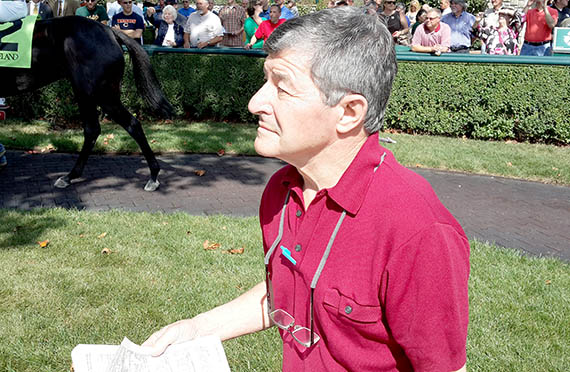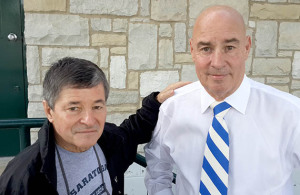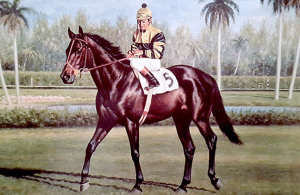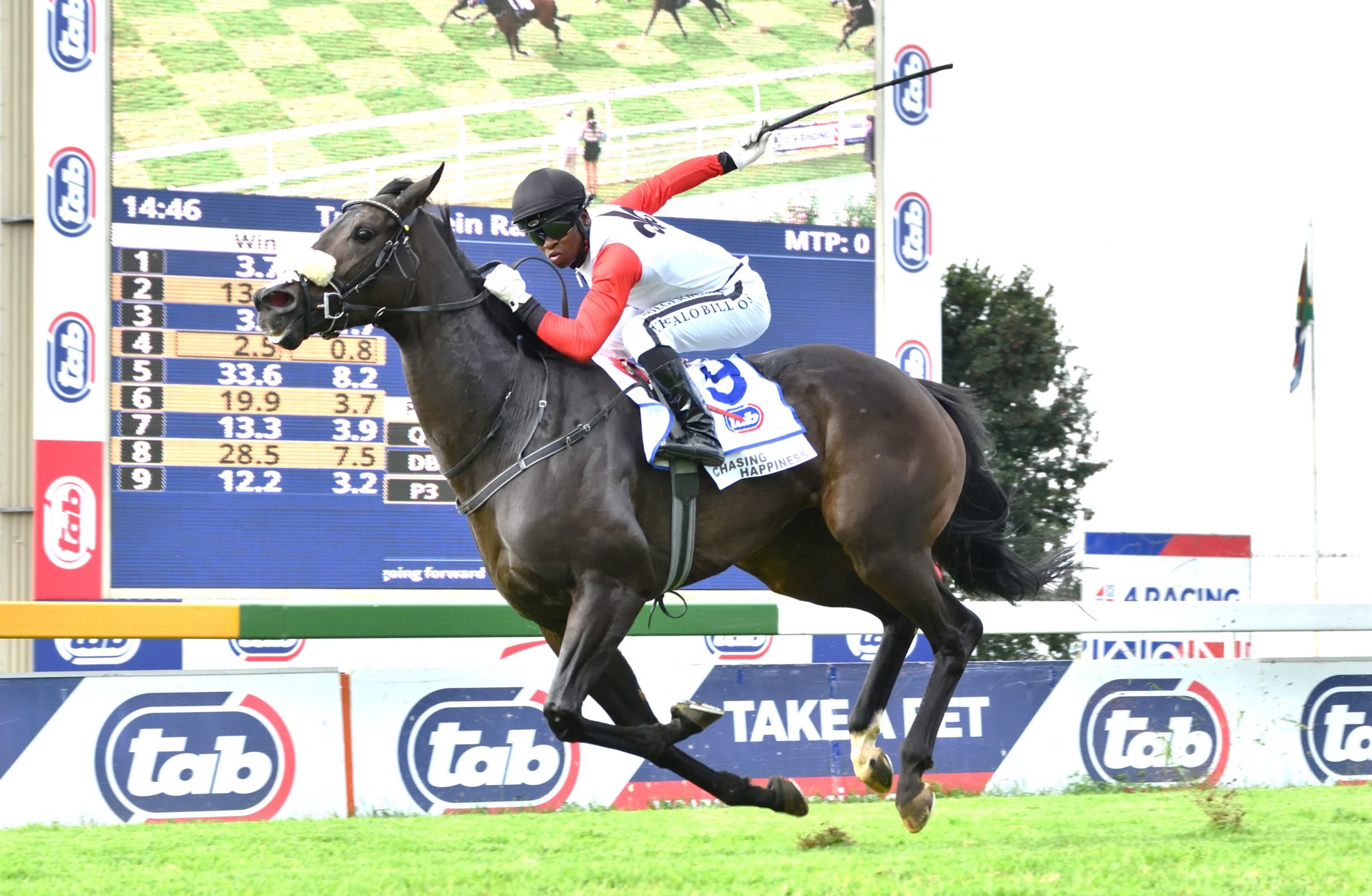
Jean Cruguet
The Triple Crown of US racing, comprising the Kentucky Derby, the Preakness and the Belmont Stakes, in that running order, is one of the most difficult feats for a horse to accomplish and only 11 have succeeded, since Sir Barton became the first to do so, in 1919, writes Jimmy Lithgow.
There have been 11 Triple Crown winners to date, but the last horse to succeed was Affirmed in 1978, who followed up the successes of Secretariat, in 1973, and Seattle Slew, in 1977.
Kentucky

Jean Cruguet and John Veitch, Trainer of Alydar
During my recent four-day visit to Kentucky, at the invitation of Saddlebred breeder, Bridget Parker, for whom I had made a video to promote her charity cause, the Simunye Project, in Zululand, I had the pleasure of meeting her close friend, Jean Cruguet, the French-born rider of Seattle Slew.
I also briefly met John M. Veitch, the trainer, of Alydar, who was runner-up to Affirmed in all three legs of the Triple Crown, and who died in very mysterious circumstances whilst standing at Calumet Farm, in November of 1990. Veitch, who had nothing to do with Alydar’s tragic demise, allegedly an insanely cruel insurance fraud, retired from training in 2003. He is now the Chief State Steward of the Kentucky Horseracing Authority, having been inducted into American Racing’s Hall Of Fame, in 2007.
Jean Cruguet has visited South Africa on several occasions, most notably when he participated in an international jockey competition, staged at Gosforth Park, in the 1980’s. He was also in Cape Town, on holiday, earlier this year. Now 74, but a man who still moves with the speed of a startled yearling, Cruguet lives close to Bridget Parker’s beautiful Parker View Farm, a stone’s throw from the magnificent Keeneland Racetrack, in Lexington. So close that he pops in and out of her home like a jack-in-the-box.
Unlike John Veitch, Cruguet has been overlooked for induction into the Hall Of Fame, and remains one of only three Triple Crown winning jockeys in that category, even though he’s been nominated for the honour in times past.
Sad Tale

Jean Cruguet on Seattle Slew
His resume records that he was raised in an orphanage, with his older brother, in the south of France. His mother, who could not support her sons, visited the two brothers occasionally, but they spent most summers with their grandparents. He met his father only three times, the last when he showed up at a racecourse during Cruguet’s apprenticeship as a jockey and asked for money. The boy gave him the equivalent of about R10 and never saw him again.
Jean Cruguet was encouraged to become a jockey by his grandfather, whose neighbour raced trotters and some thoroughbreds, but he travelled a long and hard road before achieving world-wide fame as the partner of the great Seattle Slew. Cruguet rode for a while as the replacement for Yves Saint-Martin, first jockey to the powerful Francois Mathet stable, in France, but had to vacate the position when Saint-Martin returned from his stint in the French army, sooner than expected.
Perseverance
He then met his future wife, Denise, a pioneering woman trainer in France, and they decided to try their luck in Florida, where they were married in 1965. Cruguet’s bad luck persisted. Battling to learn English in a largely Spanish-speaking environment, he took a long time to pick up any really good rides, though he did form a useful association with the late Horatio Luro, at Hialeah Park.
He won the Metropolitan Handicap at Belmont Park, on Hall Of Famer, Arts And Letters (Ribot), for trainer John Burch, in 1969, and also won the Travers Stakes, on Chompion. In 1970, it appeared that he would have a serious contender for the Kentucky Derby, in Hoist The Flag, but the colt broke a hind leg in two places in a workout before the Gotham Stakes, a prep run for the Derby. Miraculously, Hoist The Flag survived a shattered pastern and a fractured cannon bone, with the use of the first ever fibreglass cast, to go on and sire Triple Crown winner, Alleged, the conqueror of Alydar, among a number of other useful horses.
Bad Break

Jean Cruguet and Anthony Stephen
After a spell of riding in France, in 1972, when he was deprived of a winning ride in the Prix de l’Arc de Triomphe, aboard the filly, San San, after breaking his hands, in a fall, Cruguet returned to the USA to eventually taste fame and fortune aboard Seattle Slew.
In 1976, Cruguet rode the then two-year-old colt, by Bold Reasoning, to victory in the Champagne Stakes, and the following year the partnership won the Wood Memorial Stakes and the Flamingo Stakes, en route to winning the Triple Crown. In a move still written about today, and captured on the cover of Sports Illustrated, Cruguet stood up in the irons 20 yards from the finish line, in the Belmont Stakes, raised his right arm over his head, and jubilantly waved his whip in the air.
That flash of flamboyance from a man who was generally regarded as being of quiet mien, was still not enough to earn him a place in the hallowed Hall Of Fame, and despite the fact that he is revered by fans, who still stop him for autographs in the racetrack, as I personally witnessed at Keeneland, the Hall Of Fame committee has continued to snub him.
Support
If anything, Jean Cruguet deserves a medal for his steadfast support of his ailing wife, after she suffered a debilitating stroke, in 2003. For seven years he nursed her, tenderly clipping her fingernails, washing her hair, rubbing lotion on her emaciated body and turning her over in the bed that became her prison.
He’s managed to cope with life since the death of the woman he described as his soul-mate, having found a partner who controls his once errant betting habits, and who runs her own horse business. But there remains something enigmatic about the now greying but still twinkle-eyed and mercurial Cruguet, as he darts hither and zither, on the racetrack, in the barn area, and on his and Bridget Parker’s farms. It’s almost as if he’s still searching for the missing pieces to the puzzle of his life, those frustrating opportunities which passed him by.
Jimmy Lithgow








